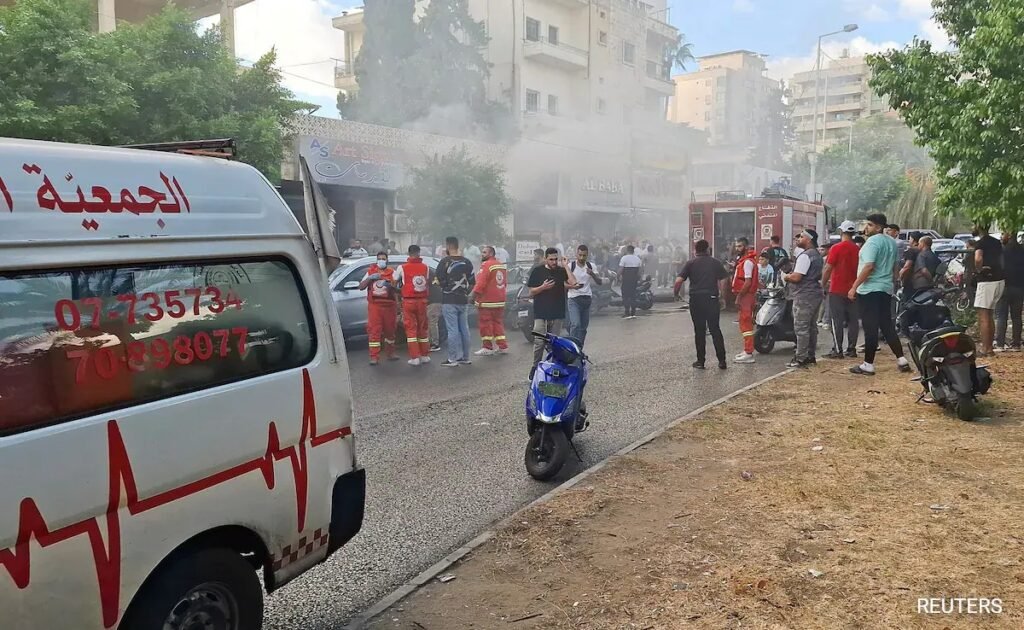14 dead, 300+ injured in shocking Hezbollah explosions in Lebanon. Learn how the walkie-talkie blasts intensified the Israel-Hezbollah conflict in the region.

Explosions in Hezbollah Strongholds: 14 Dead and Over 300 Injured in Lebanon
Beirut: 14 Dead in Hezbollah Strongholds as Explosions Rock Lebanon
In a devastating series of events, fourteen people have been confirmed dead, and over 300 others injured, after walkie-talkies exploded in Hezbollah strongholds across Beirut, Lebanon. The deadly incident unfolded a day after a similar explosion involving pagers, which killed twelve people and left nearly 3,000 others injured. These back-to-back incidents have sparked tensions and raised concerns about further escalations in the region.
A String of Explosions Across Lebanon
The explosions occurred not only in the capital, Beirut, but also across other parts of southern Lebanon. The exact number of walkie-talkies that detonated remains unknown, but the count is estimated to be in the hundreds. There have also been reports of landline telephones exploding in various locations in East Lebanon, further heightening the fear among civilians.
The blasts occurred near significant Hezbollah strongholds, with one of the explosions taking place near a funeral organized by Hezbollah for a member who was killed in the previous day’s pager explosion. A video of the incident quickly went viral on social media, showing the chaos and destruction left in the wake of the blasts.
Mossad Allegedly Behind the Explosions
Hezbollah has claimed that Israel’s spy agency, Mossad, planted explosives inside the walkie-talkies and pagers imported by the group months before these deadly incidents. Mossad has a well-known history of carrying out sophisticated operations on foreign soil, and according to reports from senior Lebanese security sources, the explosives were planted around five months ago, the same time the devices were purchased.
While Israel has not officially commented on the explosions, tensions between Hezbollah and Israel have significantly escalated following the incidents.
Iran-Backed Hezbollah Vows Retaliation
In the wake of the explosions, Hezbollah has blamed Israel for what it described as an “Israeli breach” of its communication network. The group has vowed to retaliate against Israel for what it calls the “biggest security breach” it has faced in recent times. Hezbollah also stated that it would continue its support for Hamas in Gaza, with whom Israel has been engaged in a violent conflict since October 2023.
Hezbollah has condemned the attacks, labeling them as “criminal aggression” and a “massacre.” The group insists that Israel is fully responsible for these incidents and should brace itself for retaliation. According to Hezbollah, all of the walkie-talkies exploded simultaneously, much like the pagers from the previous day, further supporting their belief that the attacks were coordinated by Israeli forces.
Rising Regional Tensions: Israel Moves Troops
In response to the rising tensions, Israel has begun reallocating troops and resources toward the northern part of the country, shifting its focus to counter Hezbollah’s threats. On Wednesday, Israel issued a warning that Hezbollah’s escalations in the last 24 hours have moved the conflict’s “centre of gravity to the north.”
The United States has also stepped in, urging both sides to avoid further escalations that could plunge the region into a broader war.
Lebanese Health Ministry Confirms Casualties
Lebanese Health Minister Firass Abiad confirmed that twelve people died in the pager explosion, with around 2,800 wounded, many of them critically injured. According to Abiad, the injuries were concentrated on the face, hands, and stomach. Iran’s state media reported that Iran’s Ambassador to Lebanon, Mojtaba Amani, was also injured in the pager blast.
Who Made the Explosive Devices?
There have been conflicting reports about the origin of the devices. Initially, it was suggested that the pagers were made by a Taiwanese company. However, the manufacturer, Gold Apollo, has denied these claims. The company clarified that the pagers were made under a license by a Hungarian company called BAC, located in Budapest.
While Hezbollah insists that Israel is behind these deadly attacks, Israel has remained silent on the issue. However, just hours before the blasts, Israeli officials indicated that they were expanding their fight against Hamas to include Hezbollah, further complicating the situation in the region.
What Happens Next?
Hezbollah has vowed to respond to the pager “massacre,” warning that Israel should prepare for the consequences. Cross-border firing between Hezbollah and Israeli forces has already begun, signaling the potential for a prolonged conflict between the two sides. Hezbollah continues to express its support for Hamas, while Israel braces for retaliation from both groups.
As the situation in Lebanon continues to unfold, the world watches anxiously, concerned about the potential for a wider conflict in the already volatile Middle East.




